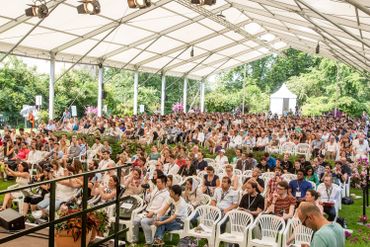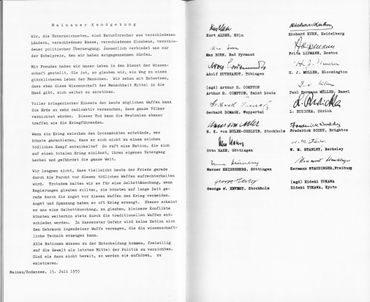The Lindau Nobel Laureate Meetings
Once every year, Nobel Laureates convene at Lindau to meet the next generation of leading scientists: undergraduates, PhD students, and post-doc researchers from all over the world. The Lindau Nobel Laureate Meetings foster the exchange among scientists of different generations, cultures, and disciplines.
The meetings focus alternately on physiology and medicine, on physics, and on chemistry – the three natural Nobel Prize disciplines. An interdisciplinary meeting revolving around all three natural sciences is held every five years. In addition, the Lindau Meetings on Economic Sciences are held every three years.
The 2015 meeting was held as an interdisciplinary meeting. From 28 June to 3 July 2015, 65 Nobel Laureates and more than 650 young scientists from all natural science disciplines came together in Lindau and on Mainau Island for this unique experience.
An extensive outreach programme that includes the digital preservation of the meetings´ legacy in a mediatheque, several exhibitions, initiatives to support teachers, and many other activities complements the Lindau Meetings.
Learn more
The meetings focus alternately on physiology and medicine, on physics, and on chemistry – the three natural Nobel Prize disciplines. An interdisciplinary meeting revolving around all three natural sciences is held every five years. In addition, the Lindau Meetings on Economic Sciences are held every three years.
The 2015 meeting was held as an interdisciplinary meeting. From 28 June to 3 July 2015, 65 Nobel Laureates and more than 650 young scientists from all natural science disciplines came together in Lindau and on Mainau Island for this unique experience.
An extensive outreach programme that includes the digital preservation of the meetings´ legacy in a mediatheque, several exhibitions, initiatives to support teachers, and many other activities complements the Lindau Meetings.
The Mainau Declaration 1955 on Nuclear Weapons
Albert Schweitzer's participation in the Lindau Nobel Laureate Meeting in 1954, inspired Werner Heisenberg to “rethink the humanitarian side of science”. Upon his intiative, all Nobel Laureates whose work dealt with nuclear research were invited to the 1955 meeting. Jointly they drafted
an appeal to political decision-makers in East and West “to reject force as the ultimate instrument of politics”. In particular they issued a warning against the use of atomic weapons. This appeal, known as the Mainau declaration, initially bore the signatures of eighteen Nobel laureates.
Mainau Declaration 1955
We, the undersigned, are scientists of different countries, different creeds, different political persuasions. Outwardly, we are bound together only by the Nobel Prize, which we have been favored to receive. With pleasure we have devoted our lives to the service of science. It is, we believe, a path to a happier life for people. We see with horror that this very science is giving mankind the means to destroy itself. By total military use of weapons feasible today, the earth can be contaminated with radioactivity to such an extent that whole peoples can be annihilated. Neutrals may die thus as well as belligerents.
If war broke out among the great powers, who could guarantee that it would not develop into a deadly conflict? A nation that engages in a total war thus signals its own destruction and imperils the whole world.
We do not deny that perhaps peace is being preserved precisely by the fear of these weapons. Nevertheless, we think it is a delusion if governments believe that they can avoid war for a long time through the fear of these weapons. Fear and tension have often engendered wars. Similarly it seems to us a delusion to believe that small conflicts could in the future always be decided by traditional weapons. In extreme danger no nation will deny itself the use of any weapon that scientific technology can produce.
All nations must come to the decision to renounce force as a final resort. If they are not prepared to do this, they will cease to exist.
Mainau/Lake Constance, 15 July 1955
German Full Text PDF
English Full Text PDF
an appeal to political decision-makers in East and West “to reject force as the ultimate instrument of politics”. In particular they issued a warning against the use of atomic weapons. This appeal, known as the Mainau declaration, initially bore the signatures of eighteen Nobel laureates.
Mainau Declaration 1955
We, the undersigned, are scientists of different countries, different creeds, different political persuasions. Outwardly, we are bound together only by the Nobel Prize, which we have been favored to receive. With pleasure we have devoted our lives to the service of science. It is, we believe, a path to a happier life for people. We see with horror that this very science is giving mankind the means to destroy itself. By total military use of weapons feasible today, the earth can be contaminated with radioactivity to such an extent that whole peoples can be annihilated. Neutrals may die thus as well as belligerents.
If war broke out among the great powers, who could guarantee that it would not develop into a deadly conflict? A nation that engages in a total war thus signals its own destruction and imperils the whole world.
We do not deny that perhaps peace is being preserved precisely by the fear of these weapons. Nevertheless, we think it is a delusion if governments believe that they can avoid war for a long time through the fear of these weapons. Fear and tension have often engendered wars. Similarly it seems to us a delusion to believe that small conflicts could in the future always be decided by traditional weapons. In extreme danger no nation will deny itself the use of any weapon that scientific technology can produce.
All nations must come to the decision to renounce force as a final resort. If they are not prepared to do this, they will cease to exist.
Mainau/Lake Constance, 15 July 1955
The Signatories
The Mainau Declaration 1955 on Nuclear Weapons was initially signed by the following 18 Nobel Laureates. 34 more Nobel Laureates signed the declaration within a year.
Kurt Alder
Max Born
Adolf Butenandt
Arthur H. Compton
Gerhard Domagk
H. K. von Euler-Chelpin
Otto Hahn
Werner Heisenberg
George v. Hevesy
Richard Kuhn
Fritz Lipmann
H. J. Muller
Paul Hermann Müller
L. Ruzicka
Frederick Soddy
W.M. Stanley
Hermann Staudinger
Hideki Yukawa
The Mainau Declaration 1955 on Nuclear Weapons was initially signed by the following 18 Nobel Laureates. 34 more Nobel Laureates signed the declaration within a year.
Kurt Alder
Max Born
Adolf Butenandt
Arthur H. Compton
Gerhard Domagk
H. K. von Euler-Chelpin
Otto Hahn
Werner Heisenberg
George v. Hevesy
Richard Kuhn
Fritz Lipmann
H. J. Muller
Paul Hermann Müller
L. Ruzicka
Frederick Soddy
W.M. Stanley
Hermann Staudinger
Hideki Yukawa

SUPPORTING THE DECLARATION
Only Nobel Laureates may sign the Mainau Declaration 2015. If you are a Nobel laureate, please feel free to contact us.
You may also make others aware of the goals expressed in the declaration, including friends, colleagues, media, or politicians.
You may also make others aware of the goals expressed in the declaration, including friends, colleagues, media, or politicians.


